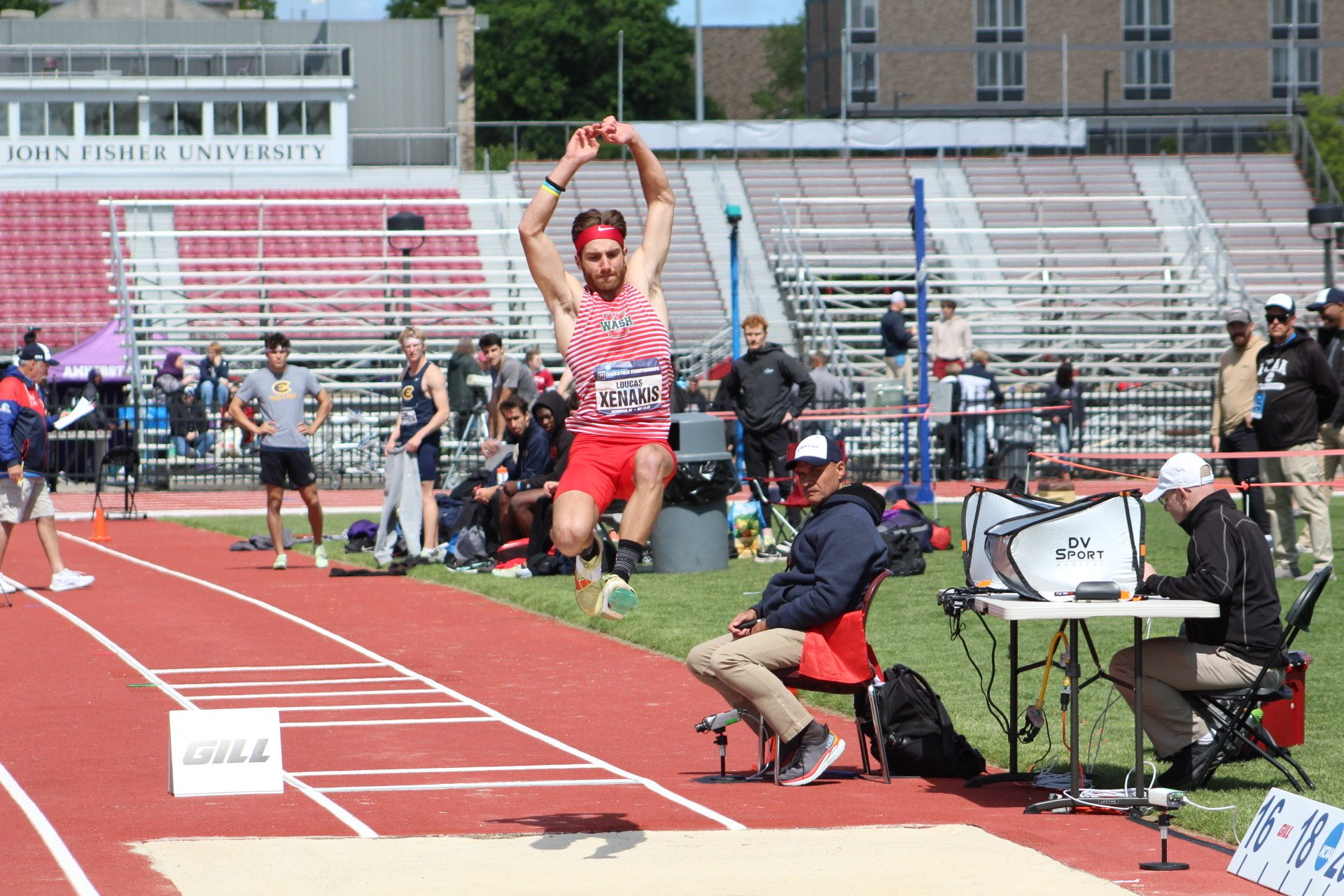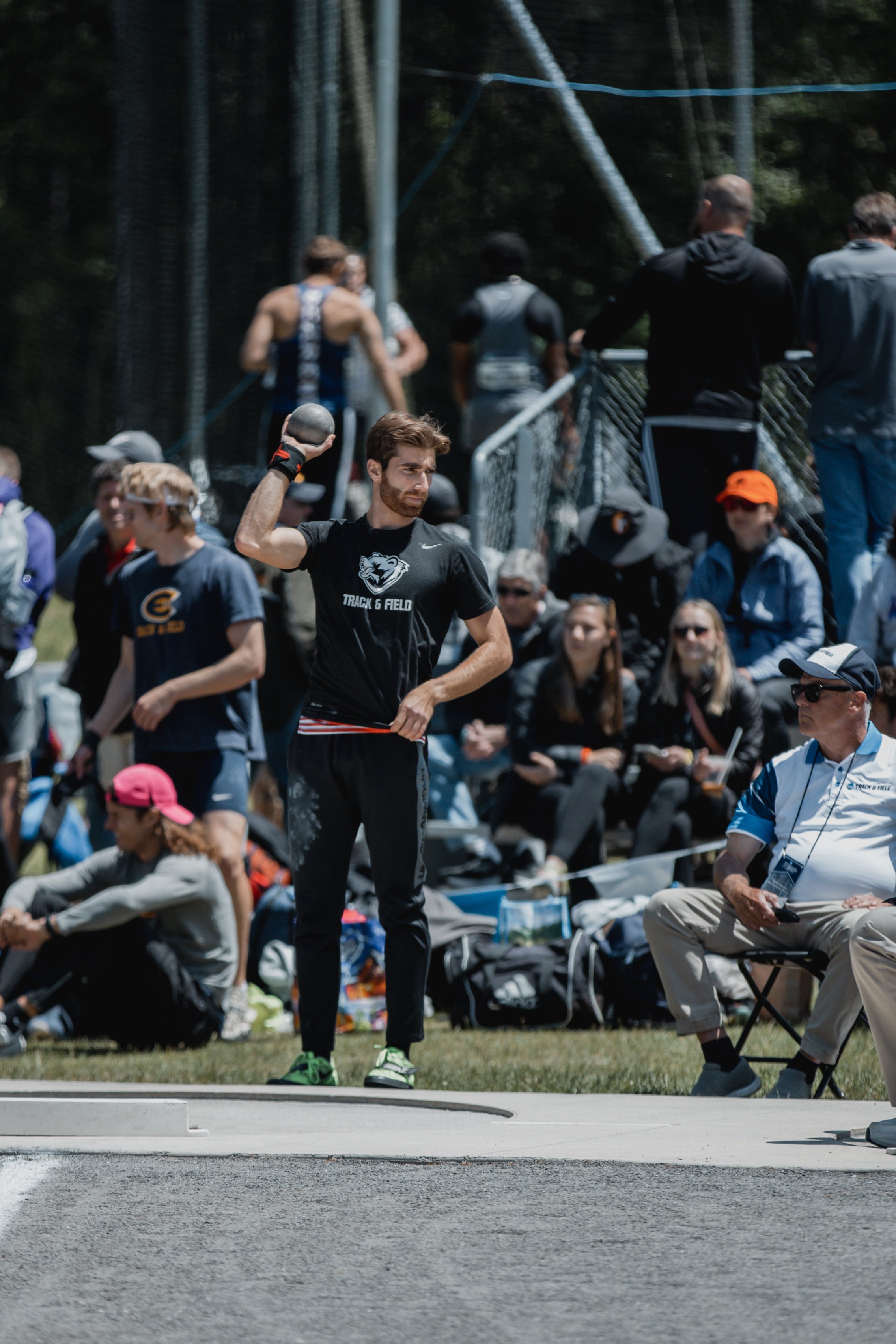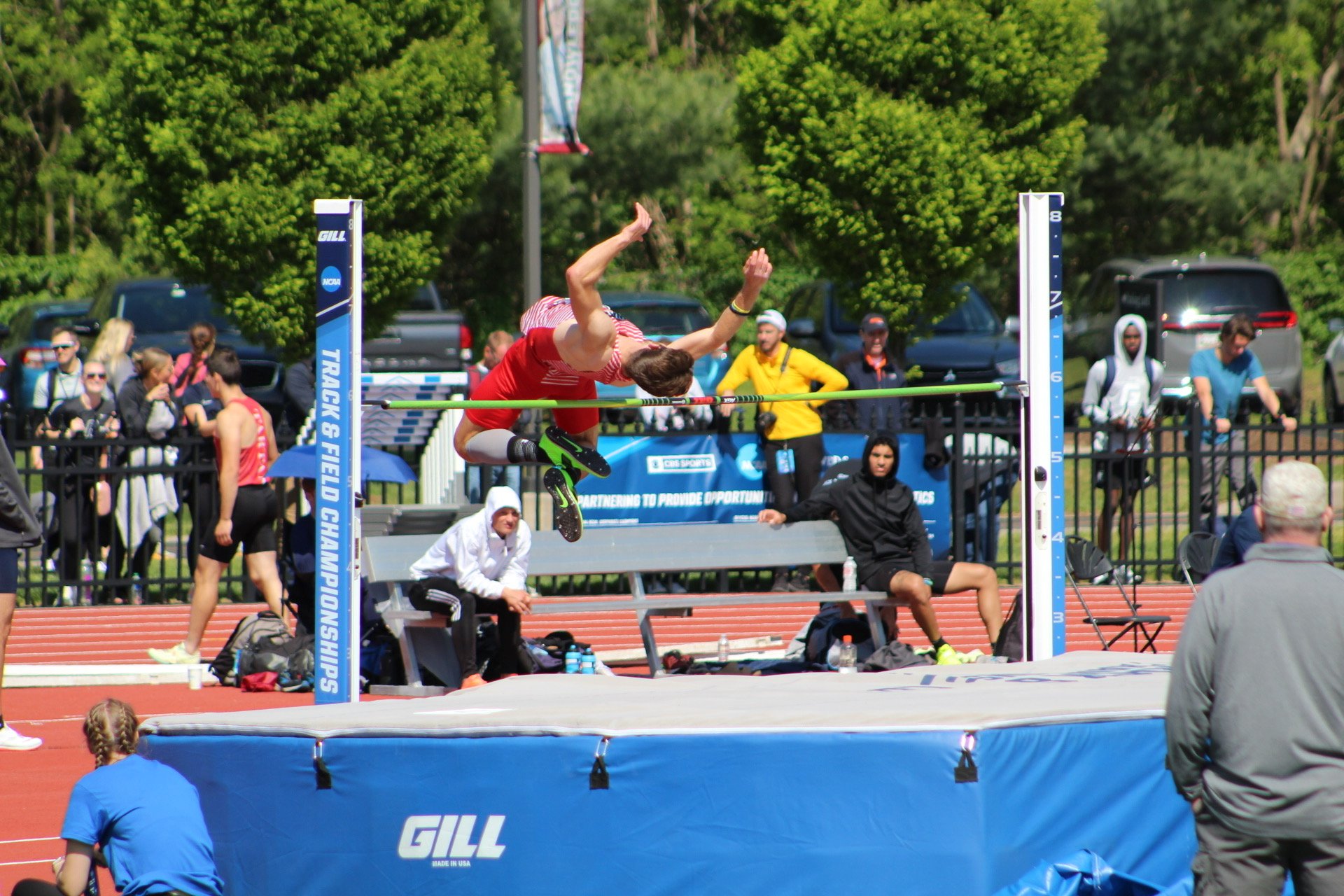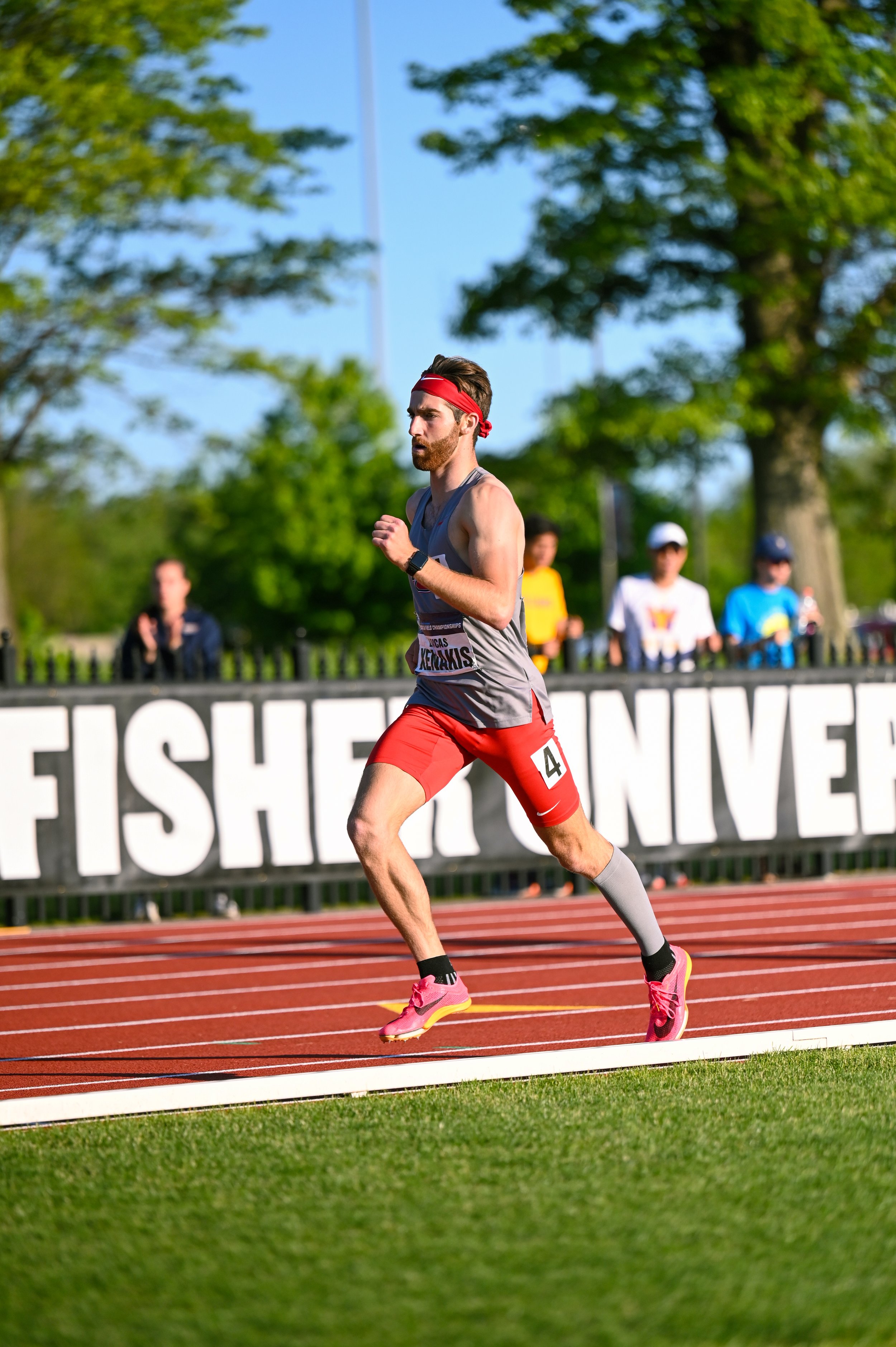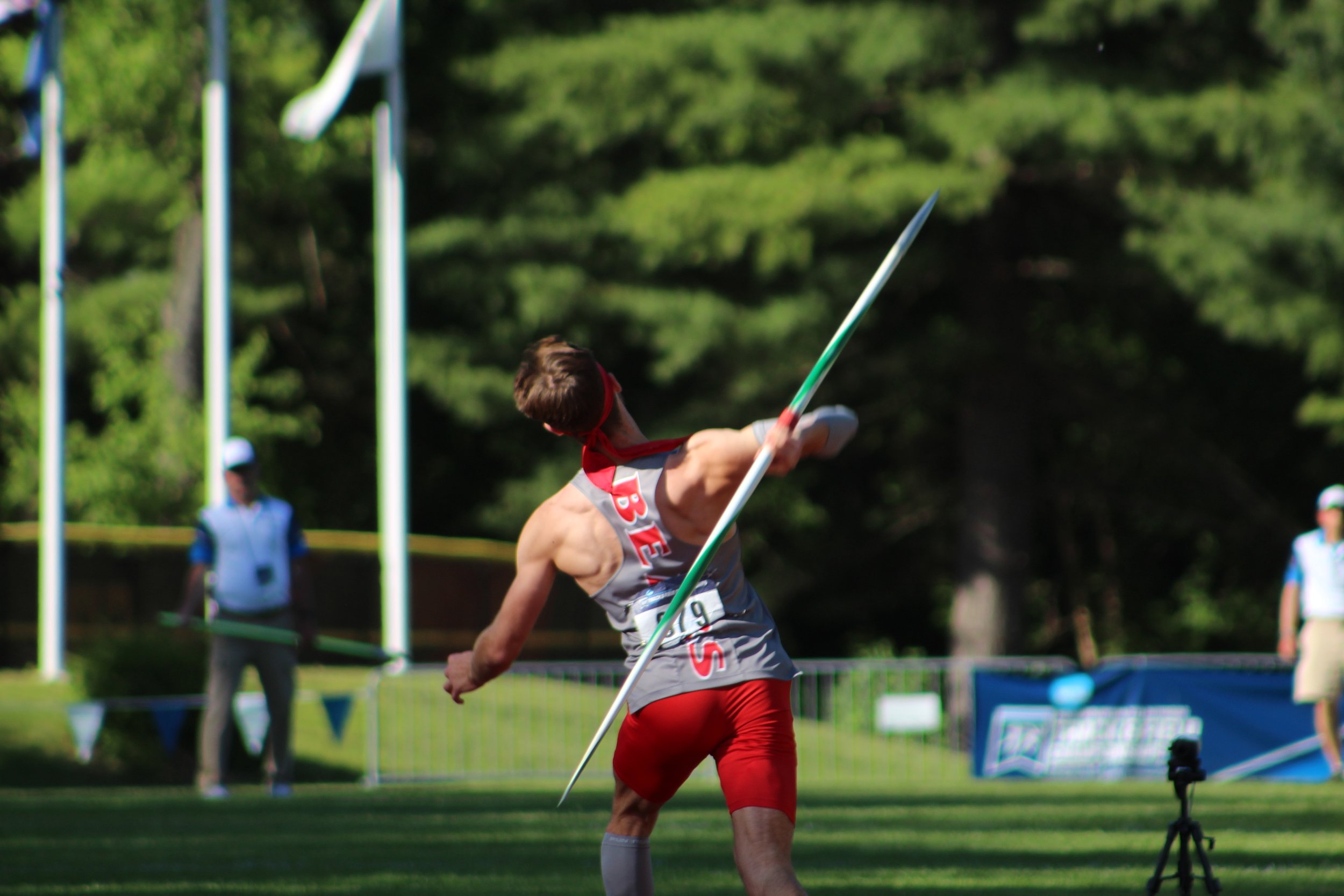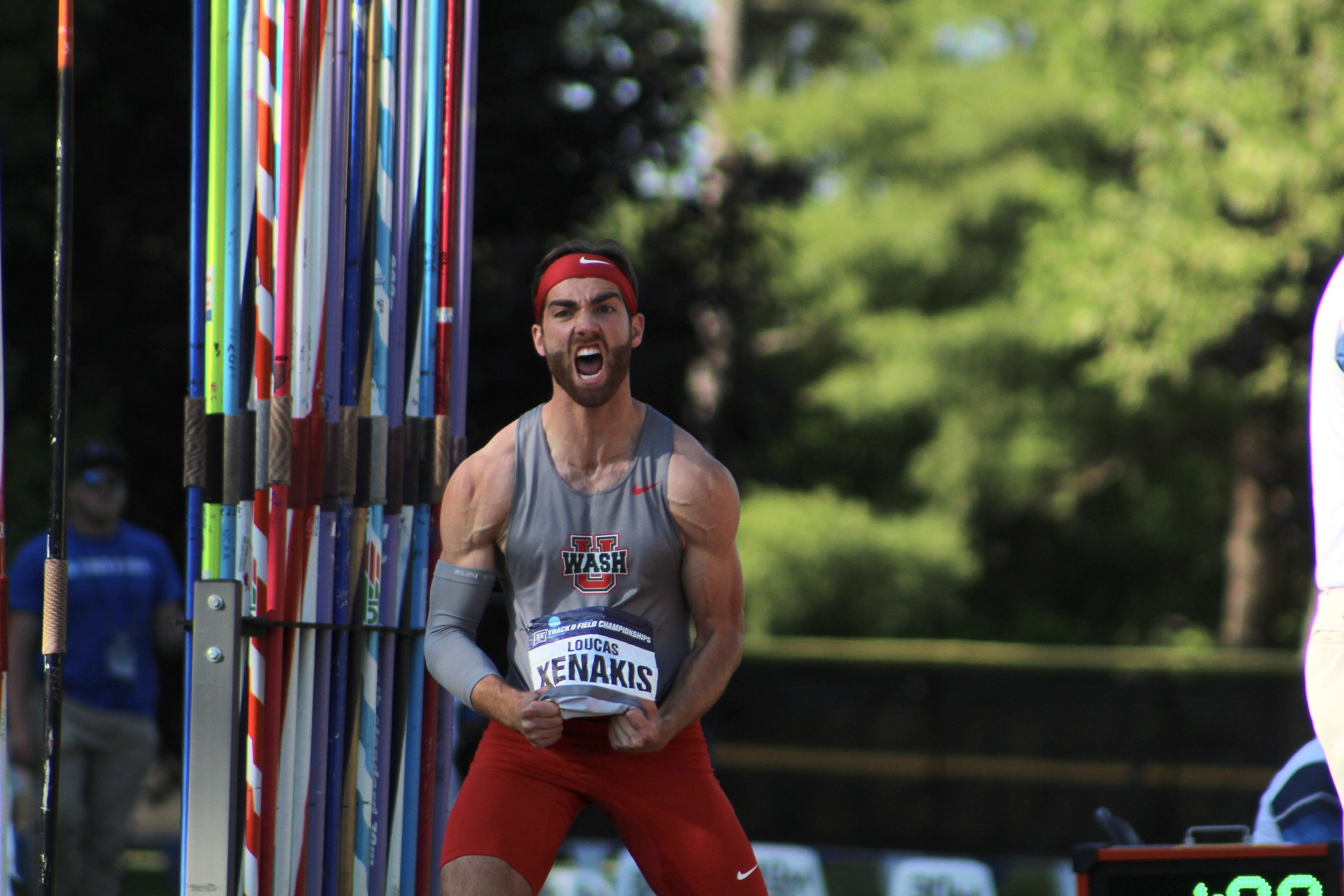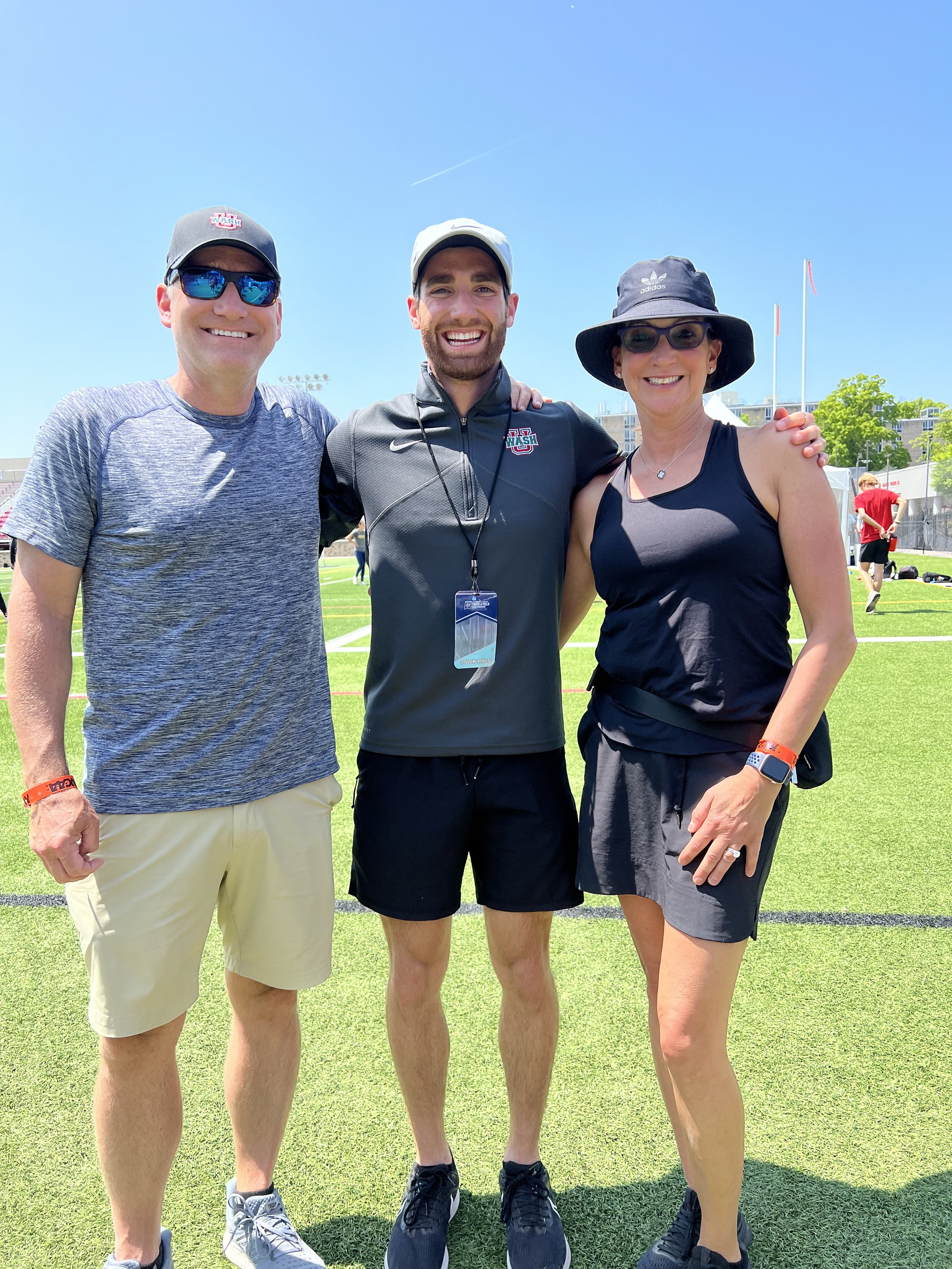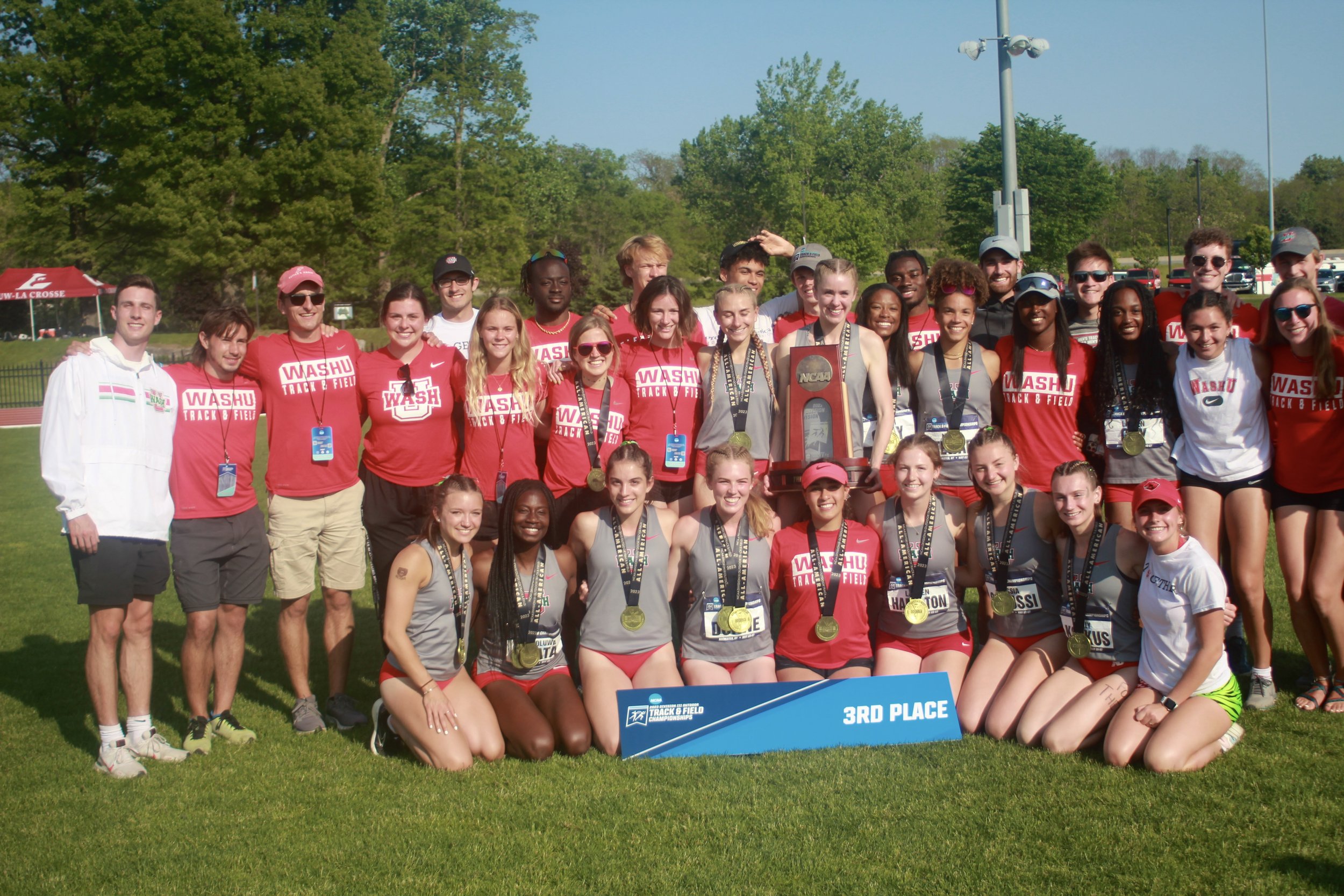Decathlete dreams on hold
Loucas Xenakis’s college dorm room is not like everybody else’s.
Covering a large section of one wall is a custom motif wallpaper of national champion trophies. In the upper left corner of each trophy square are WashU and UAA logos encircled by a pictogram of athletes participating in ten different track and field events, the signature icon for the decathlon. Atop one of the trophies are several blue sticky notes, expressing daily habits and various types of goals. As his primary goal, Xenakis wrote “fall in love with track more and more and feel satisfied with my relationship to it” with a smiley face and a hand-drawn photo of an All-American trophy.
The jovial California-born marketing and design student has an infectious personality: he’s friendly, he’s driven, he’s insightful. He wears his heart on his sleeve, prompting you to smile when he laughs at himself and ache when he gets choked up. He’s involved in a dance group where he specializes in hip hop and salsa. He plays the piano. He’s into fashion and collects what he suspects might be way too many clothes. He’s a track and field buff who knows all the big names of the sport.
Xenakis has a picture of himself posing in front of his signature dorm room wall–squatting down to not obstruct the trophies from view, pointing both index fingers up proudly at his work, and grinning with his mouth wide open as if to say “look what I did and look what I am going to do.”
Ever since Xenakis stepped on campus at Washington University in St. Louis, he has been trying to manifest something big. He wants to bring home a D3 All-American trophy in the men’s decathlon, one of the most demanding events in track and field.
Two weeks ago, at the 2023 NCAA D3 Outdoor Track and Field Championships, he saw his dreams turning into a reality, until a devastating disqualification in the 1500-meter run ripped them right out of his hands. Xenakis was seeded fifth headed into the multi’s final event, the 1500, but was flagged by an official for impeding another athlete in the 20-man race. The disqualification, and subsequent zero points that accompanied it, bumped Xenakis from fifth place all the way down to 19th and out of contention for All-American honors. Just like that, the thought of a trophy like the ones all over his bedroom wall turned from inspiration into bitter evocation.
We sat down with Xenakis to get the full story.
A season of surprises
The 2022-23 year in track and field did not go how Xenakis thought it might.
After using his freshman year to adjust to the new demands of the college multi events, Xenakis was excited to make a splash in the multis during his sophomore campaign. However, he missed a crucial bar in the pole vault while trying to qualify to nationals in the heptathlon, which truncated his hopes of making an indoor championship meet. Then, at the indoor UAA conference meet, he no-heighted in the high jump for the first time in his career, failing to score any points for the Bears, who narrowly edged out Carnegie Mellon for the UAA title (144-140.33).
With such a rocky indoor season behind him, Xenakis spoke with his coach, Tommy Davis, about where to go from there. Davis encouraged him to refocus training in the outdoor season to maximize points at the conference meet. Instead of training for the ten decathlon events, Xenakis would spend the spring focusing on three main events: the javelin, the long jump, and the pole vault.
His dedication paid off when he helped score 15 conference points across the three events. When conference ended, however, Xenakis found himself with just a few weeks to hit a national qualifying mark in the decathlon, an event he had spent little time training for after stepping away from it in the outdoor season. On a whim, he and Davis traveled to Naperville, Ill. to the North Central Combined Events meet to try to hit a qualifying mark in the decathlon. He wasn’t really sure what to expect.
“The goal was to maybe sneak in for that top 22 list,” Xenakis said, “and the result of it was actually seven PR’s out of ten events over the two days.”
His point total of 6,541 points was a new lifetime best and not only qualified him for the national meet but put him 12th on the descending order list, just four spots out from All-American. Now, the dream had some life breathed into it.
Patience, Trust, Belief, Amnesia: The four pillars of a good decathlon
With just nine days to prepare for another full decathlon, Xenakis knew that all he had to do to succeed at the national meet was reproduce what he did at North Central.
“I barely touched training–I had to throw the shot put–but I really just was like, you know, let's go try and replicate what I did at North Central at the national meet,” Xenakis said. “Let's see what happens. Let's have fun and enjoy it and give it our best shot.”
Once they had reached Rochester, Coach Davis gave Xenakis a piece of sage advice. He explained to him the four pillars that are needed in the decathlon: patience, trust, belief, and amnesia.
Xenakis explained that utilizing all four of these foundations in conjunction with one another develops a type of mental flow necessary in the decathlon, specifically. Some events go well and others do not, and the goal in the decathlon is to maximize the good and refocus from the bad.
“You have to bring yourself down from a PR in a running event because you're gonna spin out of the ring in the shot put,” Xenakis explained, “and then when you throw super far, you have to amp yourself up: okay, I gotta hit this pole right in the pole vault.”
Applying these four pillars at the national meet would seem to be a breeze for Xenakis, who had seen each of them in effect at different points throughout the year. He had been patient battling the lows of indoor season with some of the highs of outdoor. He trusted his training when he made an impromptu trip to Naperville to compete. Now, all he needed was to believe he belonged on the largest stage in D3 track and field.
Day 1 - 100m, Long Jump, Shot Put, High Jump, 400m
The air was cool and clear on Thursday morning at the start of the 2023 NCAA D3 Outdoor National Championships. The very first competitors to test out the red, spongey lanes of the St. John Fisher track were the men’s decathletes, who would begin at 10am.
Xenakis set up his blocks in lane one of heat one, calming his nerves by telling himself there were no expectations and shrugging off any residual tiredness from the decathlon he just completed nine days prior.
“That was soothing,” he said, “but also when you get on that hundred-meter line before it all starts, you're like, this is different. This is a different breed of competition.”
He admits that he fell asleep a bit in the multi’s first event. He ran 11.78, which was over a tenth of a second slower than his personal best and 20th overall. Knowing speed is not his strongest point of the multi, he moved to the long jump, which he described as having great energy.
“I mean, Jackson had the clap going from the first jump, which is crazy, but also it was great,” Xenakis said. “I had a lifetime best there, which I'd been waiting on for about two and a half years from high school, so to be able to jump that, I was like, okay, there's something here that's gonna work for me.”
In the long jump, Xenakis leaped 6.79 meters, his first career jump over 22 feet. From there, he posted an 11-meter toss in shot put on his third throw, cleared 1.84 meters in the high jump (a new season’s best), and rounded out the day with his second lifetime PR in the 400-meter dash, running 52.56.
Photo Credit: Natalie Swinehart
Even with the momentum of day one on his side, Xenakis expressed that he usually prefers not to know where he’s at in the line up between days of competition. The large jumbotron screen just beyond the 400-meter finish line, however, made ignorance hard to possess. With two new PR’s in the long jump and the 400, he was still sitting at 14th overall, two places behind his seed coming in and six positions from his goal of All-American. He wasn’t going to sweat it, though. Instead, he would go back to the hotel to sweat a bit in the hot tub.
“Day 2 is my thing,” he said.
Day 2 - 110m Hurdles, Discus Throw, Pole Vault, Javelin Throw, 1500m
The sun set and rose over Rochester, and once again, the men’s decathletes were some of the first to arrive back at the track.
“Your body's not feeling great, your mind's tired,” Xenakis explained. “You don't really sleep the first night. You're just excited dreaming of what the next day is like.”
Day two would begin with the 110-meter hurdles at 10am.
From heat one, Xenakis posted a time of 16.58, what he considered to be a solid performance. He moved down three places to seventeenth but did not panic because he knew the upcoming four events are where he really shines. The patience pillar of the decathlon was coming into play.
Photo Credit: Natalie Swinehart
“My coach back home always used to say the discus is the pivotal event, no pun intended,” he said. “You get to that seventh event and that's where things start to shape.”
Rising to the challenge, Xenakis posted a throw of 35.79-meters, less than a meter off of his PR, on his third toss. After sighing some relief, he moved onto the pole vault, one of his best events.
Photo Credit: Natalie Swinehart
In the vertical jumping events, the multi athletes utilize two pits at once: one with a lower starting bar and one with a higher starting bar (think slow heat and fast heat in running events). Xenakis was on the low pit in high jump, but this time he would be on the high pit with the big dogs in the vault.
“It was nice to be able to jump with people who were amped up to try and get big marks,” he said.
In a battle with Oshkosh’s RJ Bosshart, Central College’s Brody Klein, Stout’s Mason Barth, and eventual national champion Mitch Stegeman of Eau Claire, Xenakis jumped like he belonged at the top. He cleared 4.40 meters, matching his lifetime best and tying for fourth place overall. As a result, he would move up seven places to tenth, just outside of All-American contention. The momentum was really starting to roll now.
Photo Credit: Natalie Swinehart
Before Xenakis detailed the events of the javelin throw, he stopped to acknowledge all the people who cheered for and supported him. His competitors noticed how big his support team was by the sound that followed Xenakis wherever he went. He admitted that he, too, could be heard screaming in celebration when he cleared a bar or posted a big mark.
Photo Credit: Natalie Swinehart
Xenakis and his cheer squad headed across the street to the javelin runway for the decathlon’s penultimate event. Xenakis had mixed feelings as he made the trek to the throws camp.
“The jav for me is one where it's one of my better events, but I've struggled in college to throw it,” he said. He continued to explain that he had not thrown over 50 meters in college, and his first two throws were much the same: 47.06, 45.94. One throw to go.
“I'm like, I need to set myself up to do something special here,” Xenakis said. “I looked at my dad, I looked at my coaches and they said, ‘just give it your all on this one.’”
From a technical perspective, it can be tricky to “give it your all” in the throws, despite how straightforward this advice sounds. Focusing on too much power and not enough technique can inhibit one from using the correct throwing position.
“Something in me hit that position better than I've ever hit it in my life,” Xenakis said. “I threw a seven-meter lifetime best to place second. It was 56.95, about 189 feet, which was absurd.”
That was when Xenakis really screamed. He didn’t know what place he was in, but he knew in his heart that his dream was something he could finally grasp onto.
Photo Credit: Natalie Swinehart
“I was crying tears of joy, walking back to the van to get back to the 15 ‘cause I'm like, I can do this,” he said. “It was the first time the belief portion of those four things my coach talks about– patience, trust, belief, amnesia– was there. I was like, this can happen.”
The final event
After taking some time to recuperate and come down from his emotional high, Xenakis found himself on the start line of the 1500-meter run, the final event. He did not want to know where he was in the standings.
Photo Credit: Natalie Swinehart
His coach approached him sometime before the start to tell him not to let Stout’s Barth or Wheaton’s Isaiah Clausen beat him. A somewhat confused Xenakis nodded in agreement, figuring those were the guys he had to beat to make All-American. As the announcer came over the loudspeaker, suddenly he understood what Coach Davis had meant.
“I look up at the board and I'm like, ‘is that my name in fifth?’” Xenakis said. “And those two are ahead of me. He was saying we could move up, we could do something special.”
The gun went off. Twenty competitors folded in on each other as they embarked on a 3.75-lap finale. With steady pacing, Xenakis found a spot right next to Clausen. He could see Barth just 20 meters ahead. As competitors started to fall back, Xenakis started to gain ground. As he moved into the bell lap, he heard the crowd cheering and turned on the jets. He left Clausen in the dust and turned his sights now to Barth, who was in second. In an astounding kick, he caught Barth and placed second overall, setting a new nine-second personal best in the 1500.
Emotion overcame him. Thoughts about all he’d done to get to that very moment flooded over him: the sacrifices, the hard work, the advocating to compete in the decathlon. In that moment, he knew that he had done it; he knew that he would be an All-American.
Heartbreak
Above, Xenakis describes the picture-perfect moments that existed in the small window of time between crossing the 1500-meter finish line and learning about his disqualification. All of a sudden, these moments were snuffed out.
Xenakis learned that the reason he wasn’t on the results board was because he had gotten an impedance disqualification. Under Rule 15 Section 5 Article 3a of the NCAA rule book,
“The referee, after consulting with the appropriate officials, shall disqualify a competitor who jostles, cuts across or obstructs another competitor so as to flagrantly impede the other runner’s progress (direct contact is not necessary - any action that causes another runner to break stride or lose momentum is grounds for disqualification).”
Xenakis had impeded another competitor in the 20-man lineup during the race’s first turn. An official flagged it and reported it as an impedance.
“I step into the inside lane before I then jump back to the outside and get out of the way,” Xenakis explained, “But when I jumped to the inside, it impedes his stride. I think he takes a couple steps, like he is trying to avoid stepping on the inside, and then back into his running.”
Xenakis explained that the move was simply a matter of positioning–he was running to win and if he stayed on the inside, he was going to be stuck and unable to make a push to the front at the right time.
As every person who has ever run a 1500-meter race knows, the field can be aggressive. It is not uncommon to receive elbows to the side, a hand to the back, or a spike to the shin. Watching the full decathlon 1500 race reveals several competitors getting tripped up at various points. These physicalities are poorly monitored throughout the regular season only to have a magnifying glass placed upon them at the championship meet, rendering most athletes ill-prepared to navigate them.
Field size is also unique. The men’s decathlon 1500 is the only race all weekend that lines up 20 competitors in a single race. The open 1500 runs 11-person prelims and a 12-person final. The women’s multi runs the 800 in two 11-person heats. To further complicate the multi 1500 specifically, the scoring difference is roughly seven points per second, a trivial split.
Davis and the WashU coaching staff promptly submitted a protest to the games committee and awaited an answer. Xenakis, meanwhile, remained on the field, replaying every moment from the race in his head. Davis approached him, sat down with him, and comforted a hysterical Xenakis. Xenakis pleaded to Davis not to let anyone take away what he had worked so hard to achieve, to which Davis responded, “Nobody’s going to take away what you did.”
When champion Stegeman walked across the field toward Xenakis, he finally got an answer to his burning question, but it wasn’t the one he wanted.
“I'm standing there, my eyes wide, thinking the right thing has happened,” Xenakis said. “I vividly remember this moment of him coming up and he shakes his head and he goes, ‘it's not fair. I'm sorry.’ At that moment, I look at the podium, I look at the trophy that I thought should have been mine, and I turn around, I just start walking, and then it all just explodes.”
Xenakis would no longer receive comforts from Davis or anyone else. He needed to be alone.
I’ll be back
Xenakis was born in Bay Area, Calif. When he was in middle school, his family moved overseas to London, where Xenakis first fell in love with running via cross country. Throughout his childhood, he participated in several other sports such as baseball, soccer, and basketball. He didn’t formally start track until his family returned to the Bay Area and he started high school.
In time, he realized his athleticism from each of the sports he played translated well to the decathlon in track. Cross country taught him endurance, basketball taught him explosiveness, and baseball taught him hand-eye coordination. He started to experiment with different events in track to try to score points for his team. He did the hurdles, the sprints, and the jumps, and showed promise in all of them. The problem was that he was stretched thin with all of the other sports he participated in. His coach gave him an ultimatum: you can either be good at a lot of things or you can be great at one thing.
“I laugh because the irony is I chose the one event in track that you have to be good at everything still,” Xenakis said.
Xenakis chose to focus on track and, during his sophomore year of high school, would seek out the expertise of Ed Miller, national champion in the decathlon, Cal Athletic Hall of Famer, and one of the premier multi-event coaches in the world.
Miller saw promise in Xenakis’s javelin throw (the event that would eventually propel him into contention for NCAA All-American honors) and formally introduced him to the decathlon. Three months later, Xenakis found himself competing in his first decathlon. He did so well that he qualified for the USATF Junior Olympics in Sacramento, where he placed eighth. Now he was really hooked on the event. He would go on to compete at the Nike Outdoor National meet at Hayward Field as his last competition in high school.
“I fell in love with decathlon because it really is you against yourself,” Xenakis said. “You're thinking: ‘how can I be the best version of myself, the most fit version of myself, the most athletic, the most technically sound?’ I think it's a really good metaphor for life cause you're really just finding ways to motivate yourself and adapt.”
Xenakis admitted that the recent disqualification has scorned this relationship with the track that developed in his formative years as a decathlete. He has struggled thinking about returning to practice and is giving both his body and his heart time to heal.
Though sometimes when he reflects back on the championships he feels haunted, he also has had an adequate time to reflect on some key takeaways.
“The one thing that can't be stripped from me is the love, support, and belief I had from my coaches, teammates, and family,” Xenakis said. “I felt like I was the most loved athlete over those two days, and on a third day, just in a different way. The support I had led to what I confidently consider the greatest accomplishment in my life. For me, the motivating thing is I'm trying to chase after those picture-perfect moments before all the darkness: crossing the line with my fist in the air, jumping over the rail, all of that. Those are the moments that I'm gonna chase as an athlete, as a person. Those are the moments that the NCAA can't take away from me.”
He added that the accomplishments of the WashU team, particularly the women, who placed third overall as a team, helped him to share in success as if it were his own.
Though the forest feels thick now, Xenakis can see beams of light peeking through the canopy. At the end of the day, he knows that what happened could have been much more dismal.
“If that's the worst thing that I've ever had happen in my life, and it's in regards to doing something I love with the people I love, with the support of the people I love, and pushing myself to be the best version of myself, I've got a pretty good damn life, don't I?” he said with a smile.
When he eventually returns to training, he already knows the weak spots he will work on, like getting faster and stronger and improving his times in the 100, 400, and 110 hurdles. With two years left to compete, he looks forward to having more of a decathlon training block to prepare for NCAAs in the coming seasons.
“I promise you if there's one thing I can leave this interview saying, it's, good health and opportunity permitting, I'll be back,” Xenakis said, “And the new dream I have is to win the whole darn thing.”
Having gotten a taste of three of the pillars of the decathlon–patience, trust, and belief–all that is left now for Xenakis is to have a bit of amnesia.

